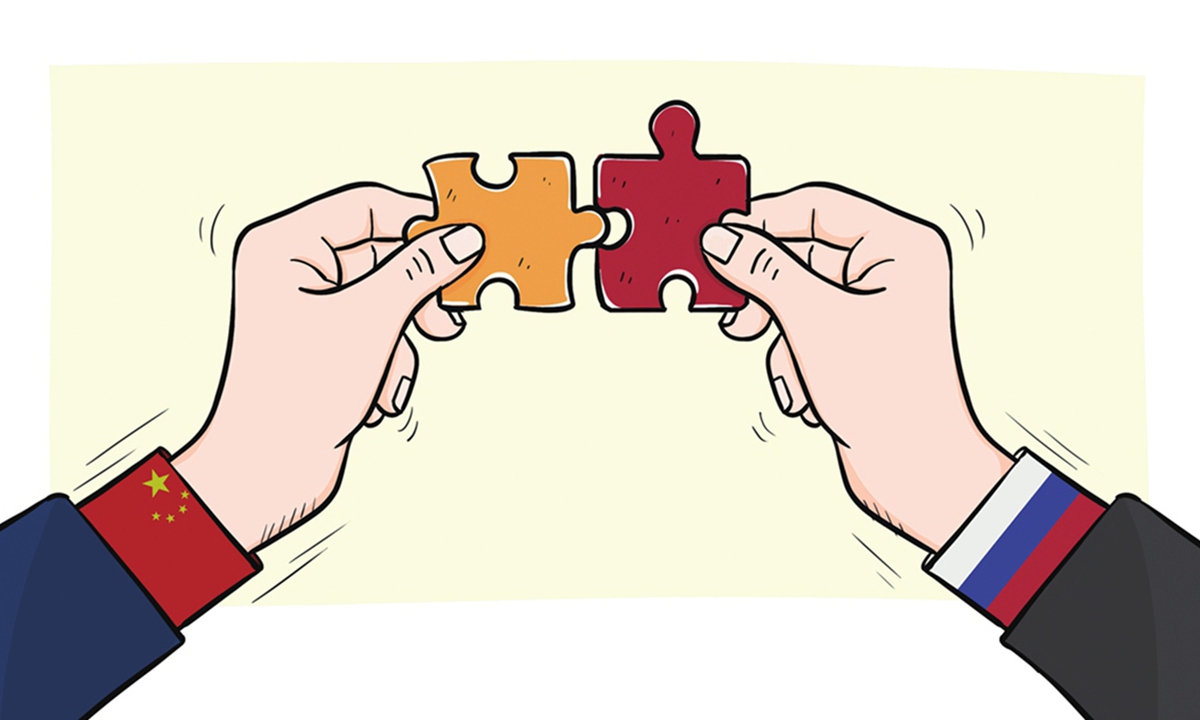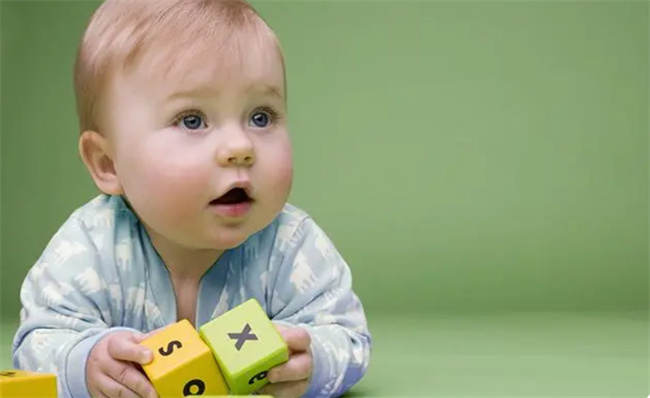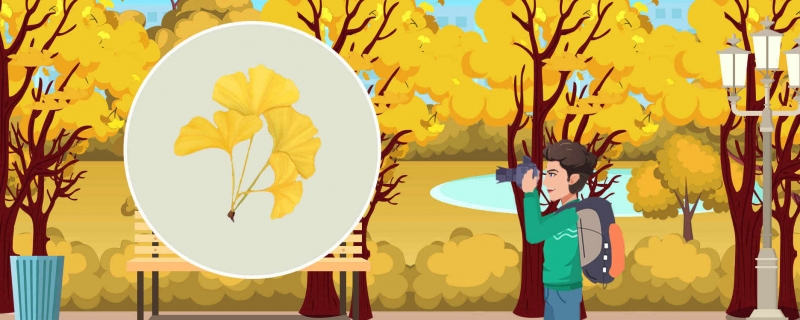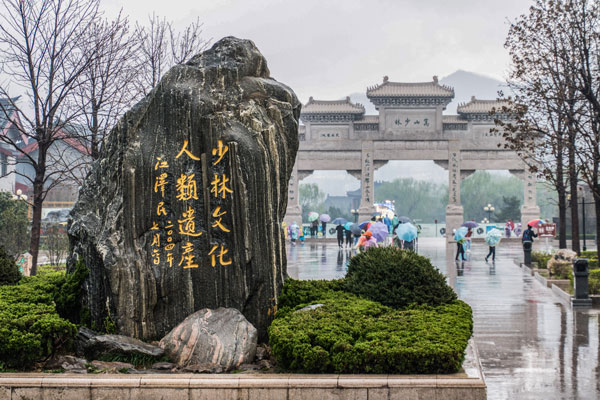Illustration: Chen Xia/GT
Russian President Vladimir Putin will pay a state visit to China from May 16 to 17, a little more than a week after starting his new term in office. This highlights how much great significance Russia attaches to developing its relations with China. Ahead of Putin's trip, Alexey Maslov(Maslov), Director of the Institute of Asian and African Studies of Moscow State University, shared his opinions on topics, including China-Russia relations and Russia's development, with Global Times(GT) reporters Xia Wenxin and Yang Sheng.
GT: This year marks the 75th anniversary of the establishment of diplomatic relations between China and Russia. How do you see the overall development of current China-Russia relations? What kind of relations does Russia want to develop with China?
Maslov:We value the stability of Russia-China relations. The one word I can use to describe our relationship is "trust." That's very important because if you look at the cooperation with the Western countries, we don't have, and we have never had, mutual trust. But with China, we have a mutual trust.
Our cooperation during the last two years developed very fast. And I think that Russia and China found a common ground and common platform for cooperation. We usually try to measure our cooperation only in the economic increase of bilateral trade, but I don't want to speak only about trade and economics. I think that Russia and China started to rethink the global situation and started to understand that certain countries have not been friendly to Russia and China. The US, as well as other Western countries, doesn't want Russia or China to be at the same level of development as it is.
Russia wants much deeper cooperation [with China] in financial and banking cooperation. We can use digital yuan for banking and financial transfers. Second, we want deeper cooperation in science and technology. I think, as Russia has a lot of technological development, we should develop our own technological sovereignty. And we can cooperate in this way.
Third, it's mutual investments. Currently, the investment from China to Russia is not very high. The annual foreign direct investment from China to Russia is dropping. And because of the prosperity of Russian trade to China, we have a lot of yuan Russian banks. So it means that Russia could invest in China and develop joint enterprises in China and Russia.
There is one more very important sphere. I think that Russia and China should work out our joint understanding of the future development of the world. I think that the present-day situation is not the end. We have a lot of so-called flashpoints. There are a lot of contradictions, and each of these contradictions could explode and lead to a global war. Russia and China should develop their own understanding on this point.
GT: How has Russia's diplomatic strategy changed in the two years since the conflict with Ukraine broke out?
Maslov:First of all, Russian diplomatic strategy completely redirected from West to East. At the same time, Russia tried to fight against the Western diplomacy. That's one of the paradoxes of the situation, because for a long time, Russia was a part of the big Western world, and Russian diplomacy was deeply integrated into Western ideas. Now, Russia is trying to work out its own ideas not connected to the Western ones. It is trying to cooperate with the Global South, including China as well as countries in the Middle East and Latin America. So in the diplomatic sense, Russia has become much less Western-oriented and much more non-Western-oriented.
During the last two years, Western countries have used anti-Russian propaganda to attack Russia. That's why Russia became much more active, for example, on the social media in countering propaganda and explaining Russian ideas, Russian methods and Russian values. It tries to explain that the so-called Western norm or Western way of development is not the only way of development.
And we try to explain to the world that multipolarity, or the existence of different kinds of poles - not only the US, China and Russia - is a normal situation and we can all cooperate. In this regard, Russian diplomacy became much more anti-colonial, because we think that the Western approach to many countries is a colonial one from the 19th century when the West tried to dictate its will on other countries. In general, Russian diplomacy became non-Western or non-pro-Western.
GT: The West has been trying to suppress Russia's development by various means, including sanctions. What specific difficulties have been caused by the Western sanctions against Russia? And how has Russia responded to them?
Maslov:Sanctions play a very important role in modern Russian development. We can divide all sanctions into several groups. The first one is financial or banking sanctions. The life of Russian people became much tougher. Russians could not use any credit cards [from Western payment systems], for example, Visa and Mastercard. Russian banks also had a lot of problems with trade and cooperation.
Another type of sanction is the export and import ones. Russia exports a lot, not just only gas and oil to the Western countries, but also, for example, aluminum and other metals. The third type is sanctions against big Russian companies, including oil and gas or any production companies. All these companies were blocked in the Western markets. In general, Western countries offered more than 16,000 different kinds of sanctions against Russia. Right now, this is the biggest amount of sanctions that has been put on one country.
But at the same time, the reaction of Russia was very fast. First of all, Russia has not fallen and we can see that the Russian economy is not falling. Last year we had a 3.6 percent of the GDP increase. This year, maybe we'll have a three to four percent GDP increase. Why is this happening? Because Russia started to produce a lot of goods by itself and we are increasing this production step by step.
First of all, Russia invested in a lot of the innovative productions, including the electronics and microprocessors. Russia started to cooperate with, for example, China in electric car production and science and technologies. It also started to produce much more of its own agricultural products. Right now, Russia not only produces these agricultural products by itself, but also exports these products more, for example, to China.
What Russia really needs right now, is much more new technologies. And in this area, we have a lot of problems, including the lack of highly qualified personnel. And that's why Russia started to develop its Far Eastern region where Russia established new centers for technological development.
GT: According to some data, since 2022, the majority of Russians have remained optimistic about the future. The recent terrorist attack on Crocus City Hall also showed the world once again how united Russians are. What do you think underpins such a strong sense of optimism and solidarity among the Russian people?
Maslov:Frankly speaking, Russia suddenly got its own national idea. Unfortunately, we need some opponents to understand what we are. We know that in China, a lot of people speak about the Chinese dream and Russia for a long time didn't have its own "Russian dream." But right now, a lot of Russians have started to understand why we are not Westerners, why part of the Russian territory lies in Asia but Russians are not Asians. We started to think about who we are and what we want.
We know that a lot of people in Russia just run away to other countries, and it's their own choice. But the majority of people became much more unified. We are unified not by military means or by trade, but first of all, we are unified under the same culture, under the same language, under the same history and destiny. This is not propaganda. I travel a lot almost every week to other cities or other regions of Russia. And I feel that the more we go to the deeper Russian states, the more solidarity we feel. That's, I think, one of the positive results in this negative situation.

孩子这3种捣蛋行为 说明是高智商的表现 父母别“扼杀”

2015平遥国际摄影大展开幕 展出作品17827幅

忻州:男子吸毒生幻觉持刀捅死路边人

11月10日起太原北站取消9趟列车客运业务

川西竹海旅游攻略 川西竹海自驾游攻略

我省宽带降费提速市民感受不一

“国考”涉晋岗位2.8万多人报名最热门的662人争1岗

全国首届青运会圆满闭幕 我省接过第二届青运会会旗

昆明腾冲旅游攻略 昆明腾冲旅游景点

第二十五届书博会9月25日在太原开幕

《疯癫吧,后生》网上热传,由山西聋人自导自演

平陆县公安开展“打非治违”交通违法集中整治第五次行动

五岳是指哪五座山 五岳分别在哪个地方

永济市90岁以上老年人每人发放500元生活补助金

我省畜牧产业规模化达58% 比全国高出11个百分点
Copyright © 2017-now 乌白马角网 版权所有